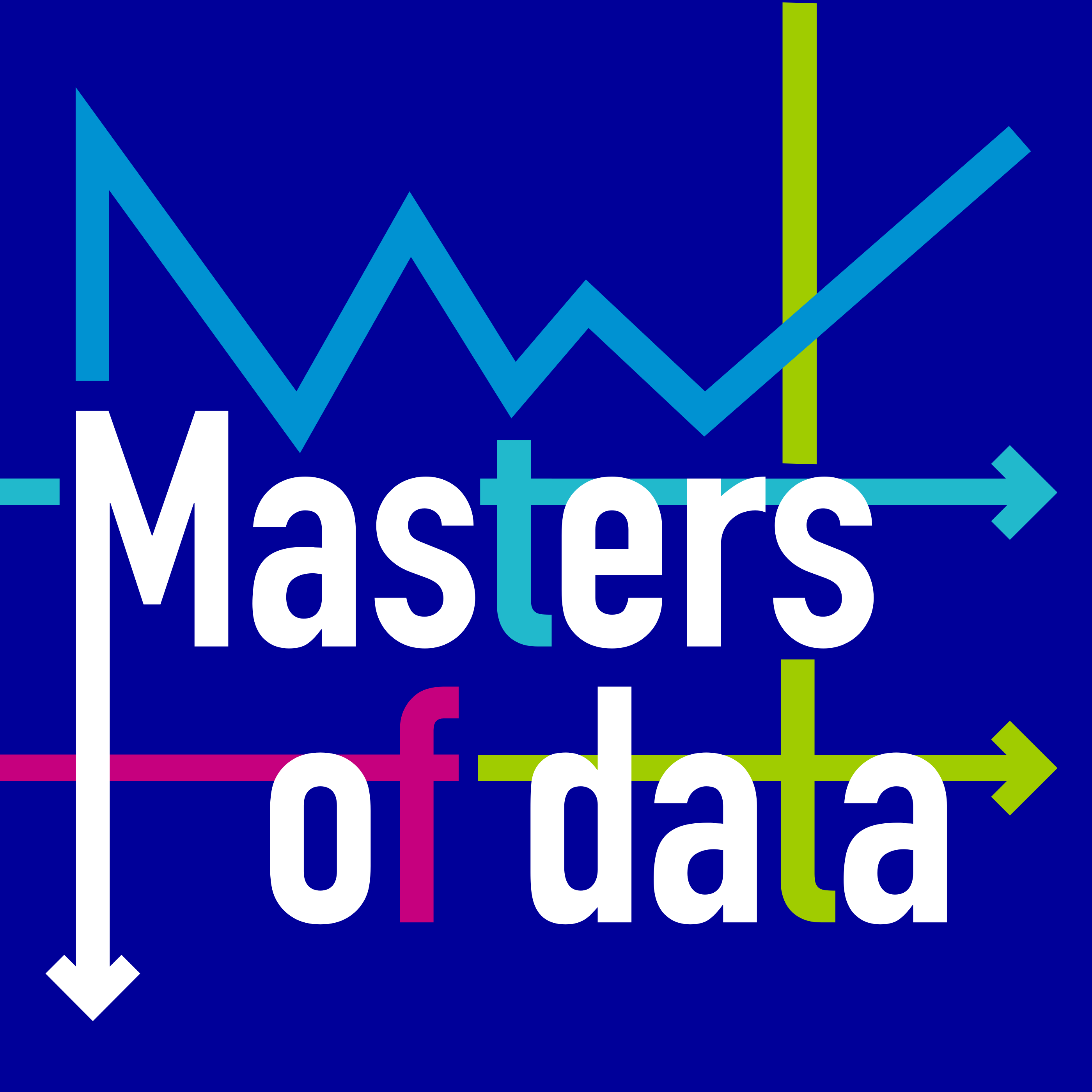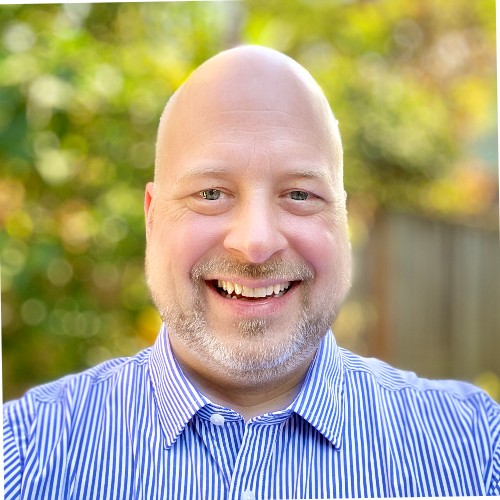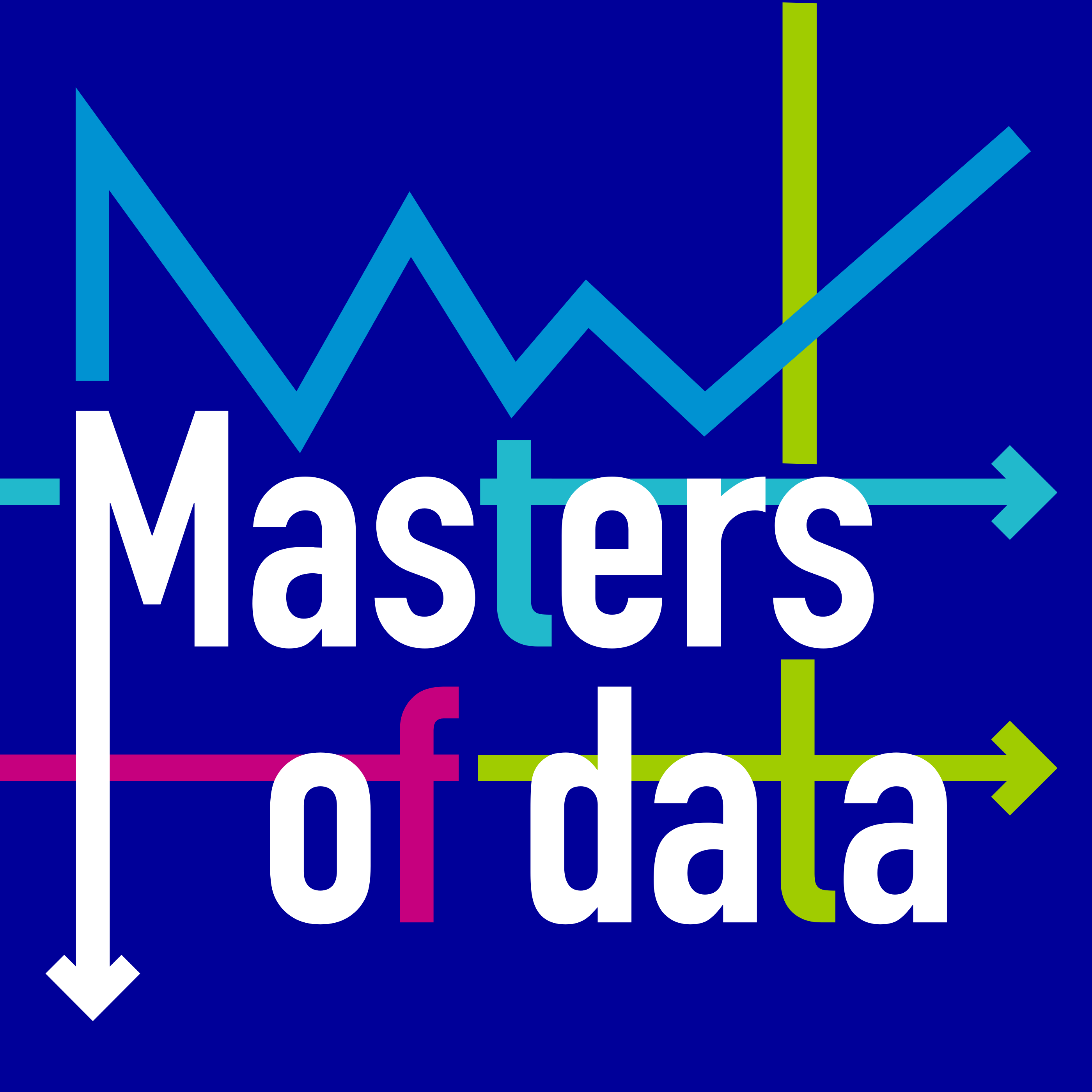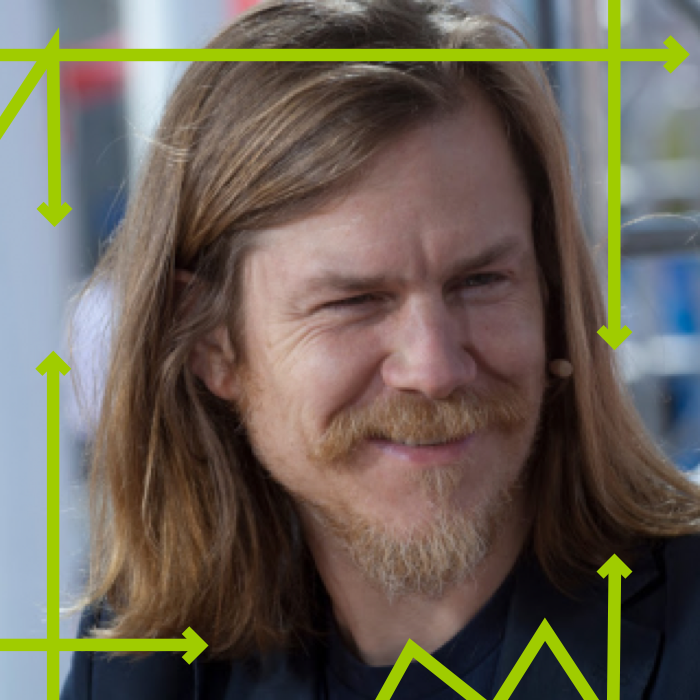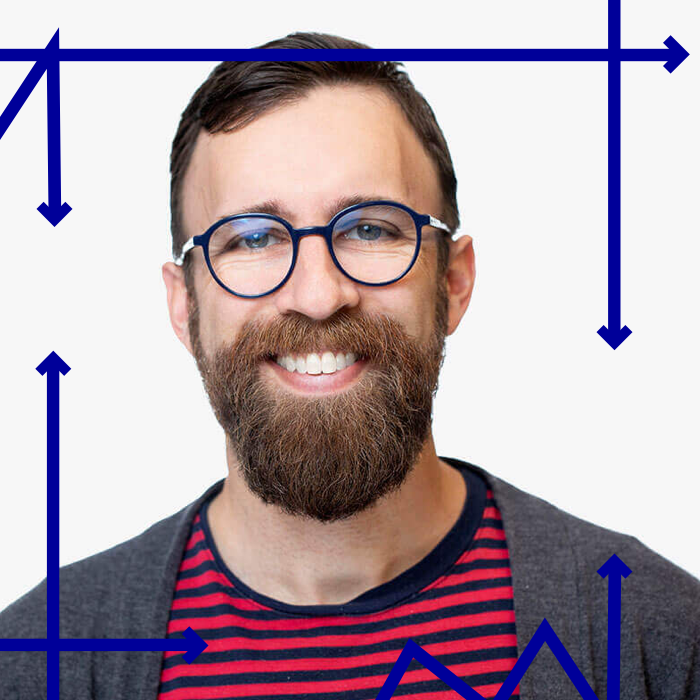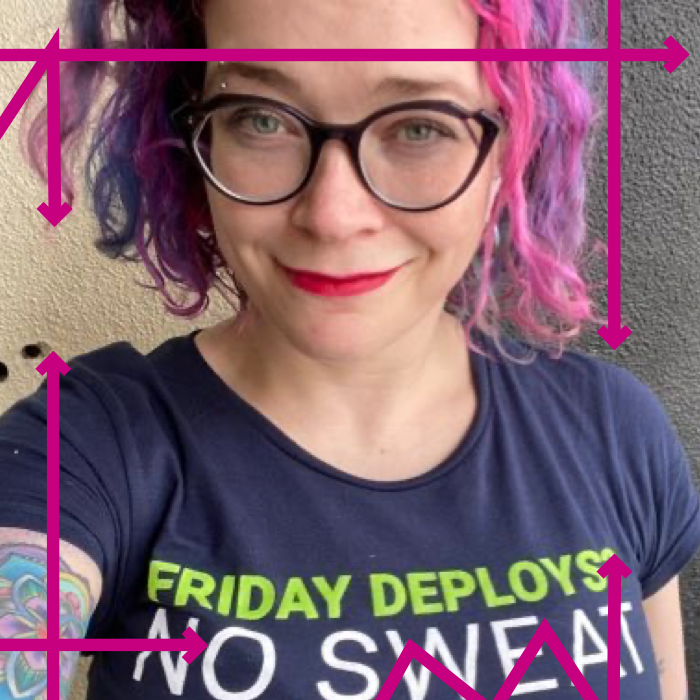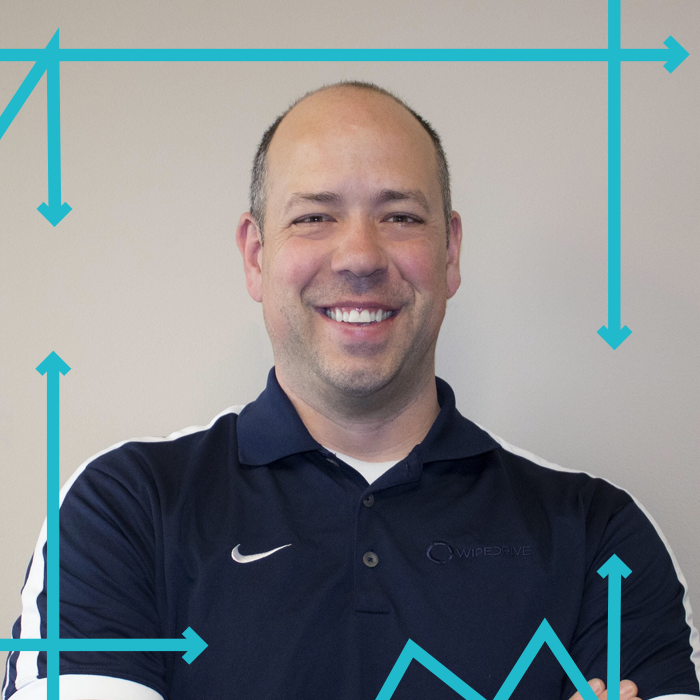Education and Social Networks (Guest: Alan J. Daly)
- 0.5
- 1
- 1.25
- 1.5
- 1.75
- 2
Ben Newton: Welcome to the Masters of Data podcast. The podcast that brings a human to data. I'm your host, Ben Newton. Today, we are going to delve into a new area, educational reform. Alan J. Daly is a professor and chair of education studies at the University of California, San Diego. He's also the author of a new book, Social Network Theory and Educational Change. Dr. Daly has been researching and writing about how social networks, relationships between people, affect how successful education reforms are. Educators and administrators are often unaware of how important their own social networks to where the crucial reforms succeed or languish. Just like in so many other interviews we have done, we back to that important lesson, you can not be successful with data alone, you need to understand how data and humans intersect. After listening, make sure to check out our website on mastersofdata.com for images and links to Dr. Daly's work. Without any further adieu, let's dig in.
Ben Newton: Welcome everybody to the Masters of Data podcast and we've definitely got a treat for you here today, something different than we've done before. We have Alan J. Daly. Welcome to the show, Alan.
Alan Daly: Thanks a lot, Ben. I appreciate being here. It's nice to be referred to as a master, I think the first time I've heard that in my life, honestly.
Ben Newton: It's something we're all striving for, right? So we'll see how you do at the end of this show.
Alan Daly: [crosstalk 00:01:37]
Ben Newton: Alan is the profession and chair of education studies at the University of California, San Diego, and he is also the author of a new book, which I think we'll be talking a lot about today, Social Network Theory and Educational Change. I'm really excited, I actually don't know if I told you this before, but one of the reasons why I reached out to you, Alan, is because one of my really good friends is a educator in Baltimore and he heard you speak before. And I was trying to find somebody in education to get into this area, and he mentioned your name. So I've definitely been looking forward to talking with you.
Alan Daly: Wow. Well this guy needs to get out more.
Ben Newton: Yeah, he thought what you said was interesting. It looked interesting to me. So let's talk a little bit about, like we had mentioned before, I love to hear about why people arrive at where they're at. I want to know about what's your story. So why did you end up in educational studies as a professor? What drove you there?
Alan Daly: Yeah, it's a good question, Ben. I mean I think I have to rewind a little bit. I grew up a poor kid, and I never intended to go to college, it wasn't on my radar, and my grandmother, who actually worked in education, she was a cafeteria lady, knew that education could potentially be the great equalizer for me and she really cared about that quite a bit. So she actually introduced me to a guy that had gone to college and I was in this garden, picking weeds, and now I have to say this now because we're both here in California, that when I'm talking about weed, I'm not talking about the kind of weed that's a cash crop here in California, I'm talking about those things that interfere with vegetables. So just wanted to get that disclaimer out for your audience.
Alan Daly: So I was cleaning up the garden and talking with him and he saw something in me. And he saw some potential in me. And that relationship changed the course of my life. And relationships are incredibly important, and that's what led me to where I am. And it also taught me a really important lesson that my grandmother, who despite working for all this time in education as a cafeteria lady, nobody ever really attended to her or her opinion, that what she was doing mattered for student achievement. And I always thought, with the complexity of educational change and reform and improvement that we're trying to do that I think it's going to take all hands on deck. Yet another reason why I'm really interested in this idea about social networks.
Alan Daly: So fast forward some years, I was always committed to this idea about education and public education, so when I finished my undergraduate, I got a teaching credential and moved out here to California. Actually, they kind of trick you, back East, because I was recruited from Boston and they come back and they show you pictures of blue skies and the beach and everything else, and I'm like, "I'm going to Cali!" And when I landed here, I was in Riverside, which is a nice place, but not so close to the beach. But the cool thing was they told me I was teaching in a bungalow. And if you're from Boston, and you think you're teaching in a bungalow, you're imagining like thatched roof, and hot and cold running Mai Tai's, and out here in California, a bungalow is like a portable trailer that smells strangely of sweat and urine somehow.
Alan Daly: But I taught out there and I was really proud to teach in the school. And I was teaching in a place that served traditionally marginalized populations. And I felt like I could do more, and so I went back to school and built on my psychology background and became a psychologist for a while, and then I went on to be a site administrator at a pretty good sized junior high school, again serving traditionally marginalized populations. So I spent about 16 years in public school practice before transitioning here into the academy. And so I've really been fortunately in my life, Ben, to serve public education from preschool all the way up to the doctoral level in public institutions, and I'm really committed to that idea.
Ben Newton: Wow. That's a really great story. You have a really interesting background. I'm sure having had all that hands-on experience in those environments made a big different in your ability to understand how to make them better, I would think, because you have real-life experience.
Alan Daly: Yeah, I think that's really made a difference. I think it's the combination of understanding the world of practice and what's happening in schools that are really on the ground level. And also with the university, I'm able to sort of combine important studies and theory and apply that to the world of practice. In my work I'm trying to connect to this place that we can call Pastor's Quadrant, so Pastor's Quadrant is the intersection of really good theory and empirical work with direct applicability that's going to make a difference in the world. And so I really strive in my own work to bring the best of theory, to bring the best of empirical work, but also I really fundamentally want to make a difference in the world. That's really critical to me and to many of my other colleagues that work here.
Ben Newton: Wow. That's great. Particularly with this new book that you authored and you're pulling together all this research, so Social Network Theory, why did you end up with that? What led you to look at that as a place where you could actually invest and make a difference?
Alan Daly: Yeah, that's a great question. So recalling back on some of the experience I had when I was growing up, I just noticed that relationships really mattered. And I also noticed in my work that this idea about the quality of our relationships is really important. So things around trust. My Ph.D. is actually looking at leadership and trust. I remember when I finished up my Ph.D. and I called my mom and I said, "Hey mom, finished up my Ph.D.!" And she says, "Oh, yeah! AJ, what did you learn?" And I said, "Oh, I learned that trust in leadership are really important." And she said, "Oh, I could have saved you six years." [inaudible 00:07:33]. But I said, "Well mom, I've documented it! It's got to mean something!" And so that idea about trust is about ... that requires another individual. And it's about interactions that we have between ourselves. And it's the quality of those ties that are really important. So I started out thinking and noticing that a lot of the work that was happening in education was deeply rooted in relationships and the quality of those relationships.
Alan Daly: And then I started thinking, beyond that, wow, it's not just about the quality of those relationships that we have, it's also about the quantity of our relationships. The kinds of networks we find ourselves in. And growing up, I was in a network of folks that would have gone on and done really good manual labor. My family is originally from Ireland. We're really good at picking potatoes, and moving wheelbarrows of potatoes, which made me perfectly equipped to dig trenches and move wheelbarrows of dirt, which I did working my through college. So my social network, in a way, would have constrained me to remain in that particular arena and I would have been proud to do so.
Alan Daly: But that one relationship, that one connection, the quantity of that tie, opened up a new network for me. And so the intersection between this idea about the social networks, the pattern of relationships we have in our life, and the quality of those relationships really became central to me in my work. So that's how I happened upon this idea around Social Network Theory, which is really about looking and examining the kind of social structure and social infrastructure we have in our own lives.
Ben Newton: When I was prepping for this, to understand more what you were working on, this whole idea of Social Network Theory, it sounds like this actually goes back quite a ways. This is not a new idea. Where did they come from? What was kind of the genesis of the idea?
Alan Daly: That's a great question. Like many great ideas, it was not a new idea. It's the applicability in different settings that makes it new. But this work goes back quite aways, actually. In fact, in 1932, a guy named Jacob [inaudible 00:09:40] actually published one of the first sociograms, and those are those network maps, if you're driving your car, these are the network maps with little dots and lines that connect them. We'll have some up on the website I think after this talk. But in 1932, there was a real problem in the Hudson Camp for Girls. So the Hudson Camp for Girls was in upstate New York, and wealthy families would send their daughters up to this camp to have a camp-like experience. And in 1932, there was a huge bunch of runaway girls. So it turns out, when rich folks send their daughters up to camp, they don't want them running away from said camp.
Alan Daly: So they call in Jacob [inaudible 00:10:20], who is a researcher at Harvard at the time, and he did a really interesting sociogram of these runaways. And what he found in the end is that runaway behavior was socially influenced. And now we fast-forward, some great colleagues here at UCSD and some other places across the globe that are now establishing that things like weight gain and happiness and voting behavior are really socially influenced. So we're starting to understand more and more about the role of the social networks in our own lives and how they're actually influential and consequential for a number of different avenues.
Ben Newton: I love that origin story. It's like only at a camp for wealthy children where they call a researcher in to figure out ... the poor kids, they call the police or something, but they're like hey, can you ...
Alan Daly: Yeah, that's a good question. It's like suddenly now, instead of calling 911, you get a scholar on the other end of it, what's the deeper philosophical underpinnings of what's going on? I just wanted to leave the camp, honestly. That's it. My friends told me to do it.
Ben Newton: No, it's fascinating. I think in particular on this podcast, what we've explored a lot is how the human and the data are connected and how you really can't pull them apart. And I think this, in particular, was one of the reasons why I was interest in this theory around social networks, because I think it's a perfect example of how it's something, I guess in graph theory, it's very mathematical, it's all so robust, but it's also very, very human. And I just find that utterly fascinating. I think it's very cool.
Alan Daly: Yeah, me, too. I think it's really. It's sort of ... you can imagine these network graphs that we use in our work, it sort of represents the quality of the relationships. You get a picture, you can start assessing the quality. But as you just identified, it's all built on graph theory, so you get this great underlying set of metrics and numbers, so for folks that really like the number part of it, we've got that. And for those who like the words and pictures, we got that. And so it really mixes these two methods that are actually and stupidly fighting against one another at times. So the applicability, I think, is really critical.
Ben Newton: To that point, why education reform? I mean on some level it makes sense because it's humans trying to educate humans, but why did you think this discipline would help you solve problems in a different way for education?
Alan Daly: That's a good question. I think for me, as I was saying earlier, it's because I see this relational interactions as so core to the work through education. And to be really honest, when I think about it, honestly, Ben, I think this is really about people systems. So yes, I'm applying in education because I'm fundamentally committed to making the educational experiences for traditionally marginalized kids better. And so I'm just applying it here. But if you worked in health insurance, or in banking, or whatever kind of industry you can name, where there's people interacting, where there's people gathering, one can start understanding the social networks that are at play. So in education, I really appreciated what you said before, because what you're doing very successfully in this podcast is mixing together the human and the data. But I think a lot of systems spend a lot of time trying to separate these two things.
Alan Daly: So for example, in the education space, there is a term we use called capital. And that's also familiar, probably, to some of your listeners in other spaces as well. And most of the times we talk about capital, we think about money, or assets of some kind. And that's a kind of capital. And you need that kind of capital to make change in systems. And other times we talk about this stuff called human capital. And human capital is your own education, or your training, or your experiences. And that's an attribute of you. So that's an internal thing just to you. And for the most part, in education, we're in the human capital business. We're about education and training and all of that. And that's really important.
Alan Daly: But the third element of this stool of change, which is a horrible name. We should never use that again. Just strike that [inaudible 00:14:42].
Ben Newton: As someone in marketing, I would advise against that, but ahead.
Alan Daly: Yeah, it evokes all manner of other things that are bad. So we'll skip over the stool of change. But the third element, so you got the capital traditional way, human capital, individual attribute [inaudible 00:14:57] knowledge and experience, and the third one that we're really focused on in the social network space is one called social capital. So social capital is this idea that there's some training and experience and knowledge that resides inside of you, and there's some stuff that resides inside of me. If I have a connection to you, and I can access all that brilliance that's inside of you, if you have a connection to me, you can access all the madness that's inside of me, and together we can actually generate something new. So the socialness of our work is a form of capital.
Alan Daly: So in educational change, we generally are focused on the human capital element. We think that most things are a knowledge problem, and so we apply knowledge and technical fixes to take care of them. And we sort of don't pay as much attention to the social capital element. Now it's not to say that we're not saying that relationships are important. Of course that's the case. But what I'm arguing is not to either pay attention to human capital or social capital, but how do we think thoughtfully about how these two types of capital and knowledge are actually mixed together.
Alan Daly: So for me it becomes more of a background, foreground issue. So typically change is foreground, human capital, everything's a knowledge problem, background the relational thing, yeah it'll work itself out. I'm suggesting we actually have to flip that, and to really lead with the relationship and lead with understanding the social infrastructure and the quality of our relationships. And then once we got that bit right, then I think the knowledge part can follow. As we think about change, particularly, actually in any system, we really got to understand that any change you want to do, any innovation we want to do, is always layered on top of an existing base state of relationships. And that existing base state of relationships may well determine the uptake, the depth, the speed at which your change wants to take place.
Alan Daly: And if that change doesn't take place, you may come to the conclusion that, "Oh, this was a really lousy idea. This is the last time I listen to Bill from accounting for this idea." But in fact it may have nothing to do with the idea and everything to do with whether or not the relationships are there to uptake this change or this innovation.
Ben Newton: And what is ... so when you've been doing research on that, what have you figured out so far about how you can actually improve the ability to put through this reform? Because I mean on some level it's ... what you're saying, and I think the best breakthroughs sometimes seem obvious in retrospect. It's like, well of course, Pete, if you have good relationships that's going to help drive reform through. But what does that actually mean in practical terms, you found out, through your research?
Alan Daly: Yeah. It's a great question. It is, I think, at times, it reminds me what I said to my Mom, right? So my big revelation is trust and leadership matters, check mark, relationships are important, check mark. Give this guy a Nobel Prize for God sake! And so I think what's really important is that although these things seem really intuitive and really obvious to us, when we design policies and we design systems, somehow we forget what's most obvious and what's most intuitive to us as human beings.
Alan Daly: If we look around at larger discourse that's happening in the world, it doesn't seem to be as connected to the humanity, and our own humility. And yet we know that to be really important. We know that people really crave authentic and genuine interactions with people. And yet we have so many system that are set up to do just the opposite. So part of what I'm attempting to do is to really just get people thinking about this idea. Learning some language around it. Recognizing that there's a pretty strong and robust and developing science around networks and how they grown and how they're consequential for action. And the first bit is just getting people to understand this sort of paradigm shift. And the second bit, then, is conceptualizing what does it look like to gather the data. And by the way, I think that's the first time I've said this word, and theoretically I'm the master of data. What does it take and what's the kind of data that we want to collect to help us make good decisions.
Alan Daly: So what we're doing with systems that we're working with is we're going in and we're actually collecting this social network data. We're saying, "What is the structure? Who do you turn to for advice and collaboration and friendship and expertise to get your work done?" And we can create these graphs and these maps based on respondence from people. Then I take that data and I literally feed that back into the system, where I show them the graphs, talk about what it means, and we dissect, engage in dialogue around how they might grown and improve their own educational systems from a relational standpoint, and then making sure that we have the important part around the human capital and training and the professional development.
Ben Newton: So I mean you're going in and you're doing basically in-person surveys with educators and administrators to understand who they go to for advice and who listens to them for advice? That type of thing?
Alan Daly: Yeah. You can actually collect the data in a variety of different ways. You can do it through online surveys, which is typically what we do. You could do it through interviews, you could do it through ... we've been doing some big work recently now looking at Twitter. So you can check out some of the work that we've been doing looking at the social networks in Twitter. We've been gathering data around how people are interacting around education policy. So if you're so motivated and not driving, you can look at hashtagcommoncore.com, all spelled out. And we'll put a link to it in the notes afterwards, I imagine. And you can see the way that we're also using Twitter to gather data. So you can gather the social network data in a variety of ways, through emails, surveys, interviews, Twitter, you can get it in a variety of ways. The challenge is how do you then take that data and process it in such a manner that you can create these social networks.
Ben Newton: Yeah. And so, when you actually get that information, this is when you produce these, and I saw some of those when I was doing the research, these pretty beautiful these kind of almost like clouds of things connected to each other, and that's what you actually produce out of this and you use that to drive some of the changes here?
Alan Daly: Yeah. That's right. And I try not to commit the sins of the past. At least in this area. Where somebody from the outside comes into a system and just says oh, all you have to do is twist the flux capacitor to level 11 and then everything is going to be fine. So what we've been doing is bringing people through this process we call guided discovery where we're actually work with them in understanding what this network is all about and what they can get out of it. And rather than imposing upon the system what I think they aught to do, eliciting or drawing out from the system what they think they aught to do. And those kinds of changes that are home-grown and designed from the people who live in the system turn out to be really strong, sustainable kind of changes than if I come in with my network cape and tell them what they should do.
Alan Daly: I can give you the small example of probably my favorite one, just to make it concrete. So we're working with this school district, and they're looking at their data, and one of the things we noticed is that it was kind of a sparse network, there weren't so many connections between the principals and these folks that work at a central office, like superintendents and directors and that kind of thing. And we're talking about this, what does it mean, what's the genesis of this, how did it come about, what should we do about it, and after all these conversations, a really cool idea came up which I loved. So the idea is that, let's pretend you're in your own organization, and you're just having a meeting with ... you have a meeting set up with one other person. So you go and you're chit-chatting, it's just the two of you. So that's a one-to-one relation. That's a really important kind of relationship.
Alan Daly: But the idea that this particular group came up with was something they call invite a third. So what they did is whenever they had a meeting, they would bring somebody else along, and that person did not necessarily have to have expertise in the topic in which the two personally originally meeting were talking about. In fact, it was better if they didn't because then they were completely unencumbered with all the other stuff that can surround conversations that people have. So you drag this person along and then suddenly, you have a relationship between you and the first person you wanted to talk to anyway, so that's there, then you also have a relationship between that person and the new person you brought along, and you've strengthened the relationship between yourself and the person you dragged along.
Alan Daly: So now we've gone from one relationship to three relationships. And that act of bringing a third along I think supported their ability to look and think about problems in different ways, so it allowed for some innovation to take place. In addition, it strengthened the number of ties that they had. That one simple activity.
Ben Newton: Oh, that makes a lot of sense.
Alan Daly: It's cool. And I think when people think about change in systems, they think that it's got to be some kind of massive overhaul. And I think in many ways, Ben, it's really these small micro experiences and micro interactions that we have that can fundamentally change systems and fundamentally change the kinds of relationships that we have. And it's just kind of small-focused work, I think, intentional, that makes a really big difference.
Ben Newton: Yeah, that makes a lot of sense. One thing that came to mind when you talk about the strength of the relationships is, so something I know happens particularly in the work world around, say, LinkedIn. So LinkedIn, I was actually, as part of prepping for this, I remember there was a tool to map out your LinkedIn connections, and I was trying to get it working last night to see if it, and it said I had too many connections. Like, I didn't think I had too many connections.
Alan Daly: You [inaudible 00:25:22] a master of connections.
Ben Newton: Yeah, well apparently. It would only take 500 connections. But I remember this whole discussion before about that a lot of the people that I have connections to on LinkedIn, I don't know particularly well. LinkedIn, just showing a connection, does not actually speak that much about how good of a connection it is. Because there's some people on there that are literally some of my best friends in the world, and some of them are just like well I just met that person, I was in a meeting with them. And that's okay. So how do you deal with that in Social Network Theory? Because I would assume that it's not just having a casual relationship or a one time relationship. Sometimes the strength of those relationships is also going to determine how well that network actually helps drive the change you want. So is there a ... how do you measure that and account for that and think about the strengths of the relationships and what actually makes them work, what makes them tick?
Alan Daly: Yeah. It's a great question. So first I have to burn some sage and then get eye of newt. [inaudible 00:26:22] immediately tell what's going on.
Ben Newton: [inaudible 00:26:25]
Alan Daly: Okay, now if I can't find eye of newt, which is very difficult to find these days. Big demand on eye of newt for making changes. You're absolutely right that the strength of the ties can really matter. So I think probably one of the most cited papers in the social science literature is a paper done by Mark [inaudible 00:26:45]. And it's called The Strength of Weak Ties. Have you heard of this study?
Ben Newton: Mm-mm (negative).
Alan Daly: So [inaudible 00:26:51] was doing network work and sociologist, and one of the things he found is, and you just mentioned this before, if you've got really strong friends, some of your best friends on LinkedIn, you're all connected to one another, and what's interesting about strong ties is it typically, in a strong tie network, you sort of know what other people in that strong tie network know. You share relationships, you're pretty much on top of what's going on in their careers and what their doing and that kind of thing. And those strong tie networks are really important because they can help move complex information. So if you and I are BFF's, or besties, or whatever the term is, I can engage with you on a deeper level than maybe I'm going to engage with the barista that I ordered my coffee from this morning. So there's something about the strength of ties that are really important.
Alan Daly: But this [inaudible 00:27:47] paper is quite interesting because he was making the argument, quite successfully, that when you want to get a job, for example, since you brought up LinkedIn, that more job opportunities actually come through weaker ties than stronger ties. So the fact that you have a weak tie with somebody actually sets you up and opens you up to a completely different network that you likely don't already have some access or connection to. So think back to the story I told you about myself growing up. The network that the guy I was pulling weeds from, he had a completely different network, and I never would have access to that except for this one link in. It was a weak link tie to this particular person which opened up a completely different set of options for me.
Alan Daly: So in our work, we're building strong ties because we know that those strong ties can really help move complex information, that can allow people to be vulnerable with one another because they have high-trust relationships, and therefore maybe they can consider and deepen their own practice. But we also want to provide opportunities to these weak link ties so that new and novel information can also flow into the system. So in systems you want balances between these things to make them work effectively. Not quite sure I answered your question, but like a good professor, I went off in some random direction.
Ben Newton: No, it actually made a lot of sense, honestly. Because I think that's ... because there's always been a lot of discussion, I remember even reading some things, or maybe just heard Reed [inaudible 00:29:17] say this about LinkedIn, but there were people that wanted, you could be able to connected with anybody, any time. And there's always been this push and pull between how representative is a social network like that of your actual relationships. But I think that's really interesting, because you're absolutely right. Particularly having moved my family from the East Coast to the West Coast, there were some strong ties that brought me here, but there were also weaker ties that enabled me to build up relationships here that I had build mostly on the East Coast. So it does make a lot of sense. It absolutely makes a lot of sense.
Alan Daly: I think one of the most interesting things that I've been learning more about, honestly, Ben, is that it ... you know this idea around filter bubbles?
Ben Newton: Right.
Alan Daly: So turns out when you're searching on Google for like, cat videos, Google does some learning about you, right?
Ben Newton: Right.
Alan Daly: So do your friends, by the way. Google does some learning about you and constrains the amount of search responses that goes back to you. It prioritizes which ones you're going to look at. And it creates a filter bubble. And that's an interesting idea, I think, in terms of the access and openness to other kinds of information. But we also have these social filter bubbles. You, probably in your own social circle, you have what we refer to as homophily, you have some set of values or similarities to the people that are in your own social bubble. And you kind of have an idea what they're about and what they stand for and all this other kind of stuff. So disrupting that can actually be really important.
Alan Daly: I read this fantastic thing, and I don't know where, about this guy that built an algorithm that goes out to Facebook on a weekly basis, or something, and what it's searching for are clubs on Facebook. So there's a knitting club on Facebook, people that love to drink IPA beers on Facebook, Hang Gliders of America. There's all these kind of random groups on Facebook that this particular guy was not a part of. So what he did is he built this algorithm and every week the algorithm would kick back a new group for him to pay attention to. And what he would do is he would actually go and try to find this group and sit in on their meetings. He intentionally disrupted his own social filter bubble in order to create and adjust to these new networks, even though the guy had no interest in knitting whatsoever, but it was a way to sort of, how do we disrupt and how do we expand our own social infrastructure and our own social networks at the end to allow new information and new connections to happen.
Ben Newton: Wow. That's fascinating. What I'm particularly, with everything going on today with the social networks in general, I think that's a very interesting point. One question I had for you, too, as you were looking through this, what was some of the most surprising things that you've found in your research in kind of practically going and working with these school systems that you did not expect to see?
Alan Daly: That's a great question. I think one of the things ... I expected, I think, networks to change more than they actually change. So one of the push backs we often get is that when you gather this data, you're gathering a point in time. And that's true. You're capturing somebody's set of interactions at a particular point in time. But one of the things I noticed is that in some places, and in quite a number of places, the sets of relationships that people identify remain actually pretty constant. So for example, you would expect your friendship network to stay relatively constant. You're not having friends and losing friends that quickly, unless you're a horrible person like me in which case you're always rotating. But you're not expecting that.
Alan Daly: But there may be things like expertise seeking or advice seeking that you might expect to vary a little bit more. But it turns out that relationships, while they do change over time, actually there's some robustness to the relationships that once people establish these patterns of interaction with people, they tend to retain these patterns of interaction with people. I think that's one surprising thing.
Alan Daly: The second surprising thing is something you alluded to earlier, which is whenever I show these maps where I talk about this idea, people have such a joyful look on their face. They're sort of like, "Wow, here's this egghead talking about the importance of relationship and how data actually connects to our own humanity." And I think they just start to have this experience where I, too, can play in this field and it's not relegated to somebody that's in an office somewhere in a university, that I can connect to this in a deeper, human level.
Ben Newton: That's really interesting. But I guess that's what make these things work, because you have to care. And one of the ways is caring is understanding at that level. That's fascinating.
Alan Daly: Yeah. I think this piece about care is a really, really important one, Ben, honestly. And I think the world can always use a little more care and a little more empathy and a little more compassion and recognizing that we live in this inescapable network of mutuality, in a way. As Dr. King said. And so we're connected to one another in deep and meaningful ways, and sometimes in ways we're not even aware.
Ben Newton: Absolutely. Well that is a great note to wrap up on. I think what you are working on, I think is fascinating and it's really great to see how data can play such an important role in a place so important like education reform. So I'm really appreciate you taking the time to come on the show and I really enjoyed the discussion.
Alan Daly: Yeah, it's completely my pleasure. And I can't wait to put Masters of Data on my business card.
Ben Newton: Absolutely. And everybody that listening, we will be posting, we will post some images and some links where you can go out and learn more, and I definitely suggest you do that because it's a fascinating area, and check for the next episode in your feed. Thanks everybody for listening.
Alan Daly: Thank you.
Speaker 3: Masters of Data is brought to you by Sumo Logic, Sumo Logic is a cloud native, machine data analytics platform delivering real-time, continuous intelligence as a service to build, run, and secure modern applications. Sumo Logic empowers the people who empower modern business. For more information, go to sumologic.com. For more on Masters of Data, go to mastersofdata.com and subscribe and spread the word by rating us on iTunes or your favorite podcast app.
Page of
DESCRIPTION
Alan J. Daly is Professor and Chair of Education Studies at the University of California - San Diego. He is also the author of a new book - “Social Network Theory and Educational Change”. Dr. Daly has been researching and writing about how social networks - relationships between people - affects how successful educational reforms are. Educators and administrators are often unaware of how important their own social networks are to whether crucial reforms succeed or languish. Just like in so many other interviews we have done, we come back to that important lesson - you can’t be successful with data alone. You need to understand how data and humans intersect.
